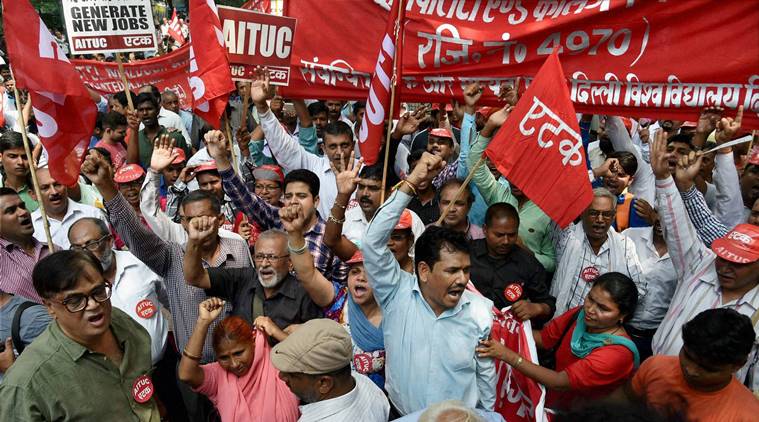
N.S.Venkataraman 8 January 2019
Ever since the great revolutionary and philosopher Karl Marx gave his clarion call to the workers around the world a few centuries back, that the workers had nothing to lose except the chain, the world trade union movement was virtually established. Since then, the workers by their consistent struggle and by raising demands, have largely achieved the objectives of the concept of the trade union movement that Karl Marx initiated.
Now, in the last few decades, the trade union movement around the world has gone full circle and has taken different style and shape, making people wonder as to whether the present day pattern of the trade union movement is what Karl Marx envisaged. Many people think Karl Marx would have disapproved the functioning style and mechanism of the current day trade union movement. Possibly, denouncing the present day trade union movement, Karl Marx would have given another call that the workers in the world have nothing to lose except the vice-like grip of political leaders who have virtually taken over the control of the trade unions and have effectively converted it into a political organization with different political leanings. This is particularly true in India, where no trade union has no affiliation to one political party or the other.
Today, the employees in the government departments in India and public sector organizations go on strike very frequently under one pretext or the other, as per the dictates of the political leadership to serve the interests of the political masters.
The strike calls have become so frequent that the common man does not anymore care to know as to what is the reason for the strike and most people have come to think that the frequent strike by the government employees including teachers in government schools and colleges, bank staff, employees in postal department and doctors in the government hospitals have become the new normal in India today.
While the calls are given to strike very frequently, on most occasions they are not for any justifiable reason. The government employees go on strike protesting against the privatization of public sector units, most of which are sick and not profit making and merger of weak public sector banks with stronger ones which are sought to be done to optimize the performance etc. Such matters have to be discussed in parliament and are not subjects to be dictated by the trade union leadership to resorting to strikes and agitations.
The demand for wage revisions are under one pretext, or the other is common justification to go on strike, though the government employees and those in the other public sector organisations like banks, postal departments, etc. are by no means poorly paid. All of them enjoy considerable benefits apart from gross monthly pay commensurate with their responsibility, and justifiably they can be termed as belonging to middle or upper-middle-income group. One should keep in view that 30% of the Indians who are not employed in government departments or public sector undertakings live below the poverty line not knowing where their next meal would come from. The government employees never care to think about their plight while all the time is thinking about their demands. The government employees are indeed not so impoverished to justify going on strike demanding wage revisions, using the strike as a first and immediate weapon.
What is particularly brutal about the Indian trade union leadership is that the decision to go on strike is taken by a cadre of politically inclined leaders, who have a stranglehold over the leadership. The mass of employees are not consulted, and they are dictated to join the strike.
On many occasions, just like the ordinary men, most of the government employees themselves do not understand the justification to go on strike. Feeling helpless, they participate in the strike unwillingly and routinely. On the strike days, not many employees come out and demonstrate but go for picnics and enjoy the holiday mood on strike days.
It is noteworthy that no employee is daring enough to defy the strike call, as the dictator like the leadership of the trade union movement would ensure that such defying employees are isolated and humiliated in one way or the other and may be harassed.
It is unfortunate that Indian trade union leaders do not have the practice of conducting a poll amongst the employees before giving a strike call to know their opinion and get their approval for going on strike. Such healthy practices are prevalent in some developed countries but not in India.
The ground reality today is that trade union movement as inspired by Karl Marx has lost its face and is no more considered as a movement of the oppressed class.
Indian trade union movement needs reform, and this can happen only if the employees in government departments and public sector undertakings and other organizations who hold the country and government to ransom by frequent strike calls, can free themselves from the political leadership and the control of the self-seeking vested interest.
The public disappointment and frustration with the present functioning pattern and style of Indian trade union movement would perhaps, bring around the much-needed changes in the structure and the fabric of trade union movement in India sooner or later and maybe, sooner than later.

Even though I do not agree with Mr.Venkataraman that the the workers by their consistent struggle and by raising demands, have largely achieved the objectives of the concept of the trade union movement that Karl Marx initiated, I do agree with him that the structure and fabric of the trade union movement in India calls for total overhauling. The primary requirement, perhaps, is political honesty among those who engage in active trade union movements and each one of them to have what I term courage of conviction which are totally lacking now.